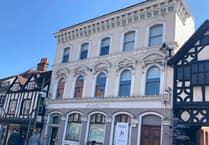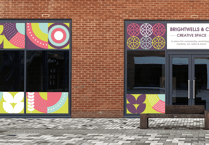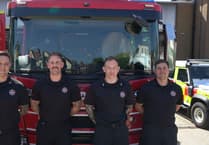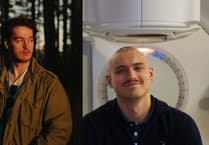Eighty years ago, the Herald reported scenes of joy, relief and solemn reflection as the people of Farnham gathered to mark Victory in Europe Day—a “God-given triumph over evil,” as it was described at the time.
Now, eight decades on, the town will once again come together to commemorate VE Day with a flag-raising ceremony at the town hall and a beacon lighting event at Gostrey Meadow on Thursday, May 8.
News of that the Second World War was nearing its end reached Britain on the evening of Monday, May 7, 1945, when the BBC announced Germany’s surrender and declared the following day a national holiday.
On the afternoon of May 8, Prime Minister Winston Churchill addressed the nation on BBC radio, officially declaring the end of the war in Europe.
“My dear friends, this is your hour,” he told listeners. “This is not victory of a party or of any class. It's a victory of the great British nation as a whole. We were the first, in this ancient island, to draw the sword against tyranny.”

As the Herald recorded at the time, more than 1,000 people gathered at St Andrew’s Church in Farnham for a thanksgiving service led by the rector, Rev G N Selby-Lowndes. The service, authorised by the Archbishop of Canterbury, began with the national anthem and included popular hymns and a heartfelt address.
Rev. Selby-Lowndes told the congregation: “Even the most indifferent and thoughtless must realise what bestiality the world had been delivered by this victory.
“But at what a cost! As there were not those among the people of the German race to stop this evil, but people who rather gave themselves to acquiesce in it. The sacrifice had to be made by the united nations.”
The church was filled with representatives from the town council, wartime organisations, and essential services, including the armed forces, ambulance, police and nursing staff.
Elsewhere around the town and villages surrounding Farnham, other churches hosted their own services and residents created their own celebrations with small gatherings for tea and cakes.
Many prisoners of war also were able to return home. These included Cecil Collins from Rowledge , Kenneth Lannister who had family in Farnham, Ernest Edwards from Farnham, Alfred Farr from Lower Bourne, Harold Tester from Dockenfield, Jerry Spedding from Farnham, and several more men who had been captured.
While the war in Europe was over, conflict continued in the East, and the monumental task of rebuilding had already begun.
Overseas, Farnham residents were involved in the aftermath of the Nazis atrocities. For example, the Herald reported on the humanitarian efforts of Marjorie Ashbery, daughter of Mr and Mrs P Ashbery of Beaumont College.
Marjorie left her post as head game mistress at a school in Lincoln to join the Friends’ Relief Unit, volunteering to assist following the liberation of the Bergen-Belsen concentration camp, where a deadly typhus outbreak had spread.
“Our day starts at 7am and we don’t arrive back from the hospital and the camp until 8.30pm to 9pm and then there are chores to do,” she said.
“We are helping an army unit and a casualty clearing station to evacuate and nurse typhus patients in a concentration camp. No British women are allowed to visit the camp, as it is considered too horrible.
“In the four days we have helped, there have been 2,500 people evacuated. Nurses think 20 percent of them will live and the doctors think about 45 percent will live.”
She also noted the disparity in conditions: SS officers nearby lived in relative comfort, with medicine, clothing and well-furnished apartments—just miles from where camp survivors struggled with death, illness, malnutrition and extreme deprivation.
As Farnham prepares to honour VE Day once more, the Herald’s accounts from 1945 serve as a powerful reminder of a community shaped by the hardships of war and united in its commitment to remember.





Comments
This article has no comments yet. Be the first to leave a comment.